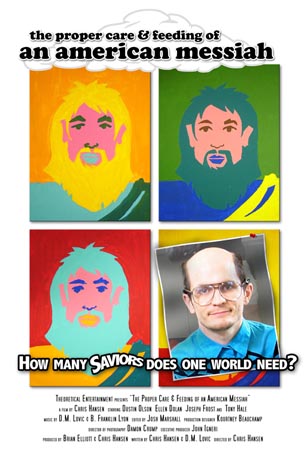Story Ideas and Storytelling
Okay -- any of you writers out there, I'd love your input. I teach screenwriting here at Baylor, and I like to spend a decent amount of time at the start of the semester working with the students to help them understand the essentials of story, in large part because they haven't had much exposure to analysis of good storytelling.
So -- if you had an hour or so to talk with students or get them to do a writing exercise related to this, what would you do or say? What's the most important or most helpful thing, in your opinion.
And next up in class we're going to be talking about idea generation. I have plenty of notes on tools for brainstorming, but I'd love to hear other writers' ideas on where they look for ideas, how they get ideas, etc. In part, I'm trying to give the students some defined methods to get them thinking, but I'm aware of how ill-defined "idea generation" ultimately is.
So -- if you had an hour or so to talk with students or get them to do a writing exercise related to this, what would you do or say? What's the most important or most helpful thing, in your opinion.
And next up in class we're going to be talking about idea generation. I have plenty of notes on tools for brainstorming, but I'd love to hear other writers' ideas on where they look for ideas, how they get ideas, etc. In part, I'm trying to give the students some defined methods to get them thinking, but I'm aware of how ill-defined "idea generation" ultimately is.



6 Comments:
Ten Things I Wish I Knew When I First Started Writing
1) Write for the reader. If it doesn't work on the page, it doesn't work. Period. Don't think, "Oh well, this doesn't read well, but it'll look great when it gets shot." If you're writing for spec, the page is all that matters. Write for the reader and only the reader.
2) Your first page needs to be your best page. If it's a comedy, I need to be laughing (hard!) by the end of page 1. If it's an action film, something amazing needs to go down before I flip the first page. Same for every other genre. Hook the audience with the first page and you'll have their attention long enough to get through your film's setup.
3) Commercial, commercial, commercial. If you're serious about screenwriting, write the most commercial thing you can stomach. Big premise, big characters, big ending. You should be able to pitch your idea within 3 sentences and hook anyone interested in that genre. I've spent the past 4 years writing a movie I would probably have no interest in seeing, only because it is ultra-commercial. Start commercial, then, once you get your foot in the door, consider something a little less bankable.
4) Less is way, way, way, way more. Every word, nay every character, needs to be considered for a possible "delete". The best screenwriters tell us only what we HAVE to know -- not an ounce more. If you don't know why you are writing a particular scene or sentence, you shouldn't be writing it. Every thing written has to have a strategic purpose. See Andrew Kevin Walker's work ("The Game," "Seven," polish on "Fight Club") for a good of example of how to say a lot using very few words.
5) Learn to love notes. No one can pull off a screenplay in one draft (at least no one I know). Understand that you will likely rewrite the majority of your first few drafts. Find a series of people you trust, convince them to give you notes, and be patient as it often takes months for everyone to get back to you. Finishing a screenplay that is worth circulating to people with the ability to do something with it takes a very long time. In addition, you only get one read from these people (in all likely hood, they'll only read your first 10 pages unless they're compelled to keep going).
6) Read every screenplay you can get your hands on, especially stuff that sucks. I like to think that I learned how to write by working for a literary manager in LA, doing coverage for him. I would read all the crappy submissions he got every day and pass on the stuff that worked. The most important thing for me was to see what worked and why. After 10 scripts that sucked, it was quite illuminating to see one that didn't, and I took note as to where the differences were. SimplyScripts.com is a great site to read produced and unproduced screenplays. There is no way to learn how to write faster than reading other people's work.
7) Be aware of formula. I'm not saying you have to exactly stick to the three act pattern, but be aware of where you are, where you are going, and where you need to be. That is strategic, commercial writing. Outline before your write, don't write in the dark.
8) Throw out your first ideas or approaches to each and every scene or moment. Nothing will get your audience to yawn faster than a scene or moment they've seen on screen before. Think about different, wholly original ways to move your story along. Cliches kill.
9) Obsess over transitions. Tolstoy once said that the single most important aspect of writing is understanding how your story flows from one event (one scene) to another.
10) Cheat. Remind us who characters are ("Bobby, the guy who shot Jimmy in the parlor" or "Sara, still wearing her hair in pigtails"). Use cute little antidotes like a novel would (at a rave, I once described my square-looking hero as "sticking out like a Baptist at Woodstock"). The more fun this thing is to read, the better you're doing. See David Ayer's "Training Day" for examples of this. He uses tons of this stuff, and it just reads so much easier as a result.
Hope some of this helps.
I should also say: this is all just the way I see things, my interpretation of how the industry works. My goal is always to sell, not necessarily to write great material (though I'd love to do both).
Anyone out there reading this should feel free to tell me that I have no clue what I'm talking about and that I'm just flat out wrong!
Ugh.
Jonathan. If I ever had to write the screenplay you describe I might just injure myself.
It might make a buck, but is it worth it?
:)
LOL -- Dan raises a good point. And that point is (if I may stretch this to where I think it is going): why do you want to write?
From what I know of Jon, you don't want to be "a writer," per se. From what I know of Dan, you do.
And I do, too. What I usually end up with, personally, is that I don't really want to write just to sell. That's not why I became a writer. I want to write the stuff that I want to write. And I'd like to sell THAT.
But some of Jon's points are valid regardless of your intent (i.e., economy of expression, really great opening, etc.)
Agreed on all counts. We were clearly coming from different angles.
I suppose it's a forever tension for the writer. (as you describe in your posts about indie vs. commericial films.)
yeah -- i think that's a legitimate tension. it is for me, anyway. i really WANT to do commercial stuff, but my instincts as a writer/artist lead me away from that (in many cases). yet i keep Jon's argument in mind, too (do the commercial hit, and then you will have an audience for your less commercial stuff).
Post a Comment
<< Home